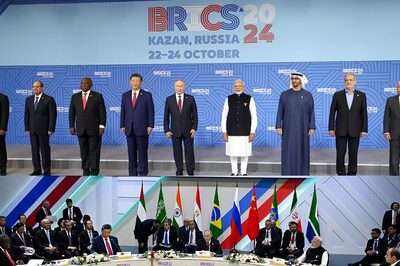
views
New Delhi: With an estimated cost of $2.5 trillion till 2030, the Economic Survey said India would “endeavour to do the best possible” in the global battle against climate change, but called for “substantial scaling up of financial resources” by developed countries and providing “credible” numbers as to “exact size” of climate finance towards developing countries.
The amount is roughly 16 times the current net worth of Amazon founder Jeff Bezoz, the world’s richest individual.
Although the Economic Survey admitted that there remained a “wide variation” among states towards the achievement of sustainable development goals, it said, “The fulfilment of pledges by developed countries through provision of ‘new and additional’ financial resources is an important contingent factor.”
The survey pointed out that an “important feature” of the Paris agreement is that it seeks to “elicit ambitious action” from each country by basing it on a country-driven approach, where each nation works out its Nationally Determined Contributions (NDC). In the case of India, the “overall assessment and quantification of finance requirements for adaptation and mitigation for a country with so much diversity and demand” remains “a difficult task”.
Last week, environment minister Prakash Javadekar had said the developed world was responsible for the effects of climate change and argued that India would not bow down to international pressure on the issue. "Over 70 per cent of the greenhouse gases emission was due to the developed countries while India's contribution is just 3 per cent. There was over consumption by the people in the developed world,” he said.
As per India’s NDC, preliminary estimates say the country would require around “$206 billion (at 2014-15 prices) between 2015 and 2030 for implementing adaptation actions in key areas like agriculture, forestry, fisheries infrastructure, water resources and ecosystems.”
Additional investments would also be needed for “strengthening resilience and disaster management” and that preliminary total estimates for India’s climate change action would between now and 2030 would be $2.5 trillion (at 2014-15 prices). “Finding required financial resources is going to be a daunting challenge for the country,” it summarised.
The survey quoted a 2018 Oxfam report that provided an assessment of $100 billion goal for climate finances and said that the report states that “aggregated climate finance, estimated as net climate-specific assistance is far lower than the reported climate finance” and that “new climate-specific assistance may be just $16-21 billion”.
“It is time for the global community to exhibit the requisite momentum to act upon their responsibilities on establishing the enabling environment for climate action,” the survey said.
While maintaining that the “value of loans” was being “over-reported”, the survey added that “if the finance for development projects that only partially cover climate change were reported more accurately, annual bilateral flows of public climate finance could be between $10 billion and $15 billion lower than reported.”
It added that grant-based assistance remained low and only an estimated $11-13 billion was given as grant, constituting just 23-27 per cent of the total public climate finance.
“The message is loud and clear. We need to establish more credible, accurate and verifiable numbers on the exact size of the climate finance flows from developed to developing countries. Paris agreement and the NDC implementation will commence post 2020 and international public finance flows from developed to developing countries remain the critical enabler in ramping up these actions,” it said.
The survey claimed that India’s policies had taken the “corrective initiatives” towards the efficient utilisation of its available resources, pointing out that 33 states and union territories had already created State Action Plan on Climate Change (SAPCC), while a Union government scheme, ‘Climate Change Action Programme (CCAP)’ was launched in 2019 at a cost of Rs 290 crore. The budgetary outlay of CCAP for three years from 2017-20 was Rs 132.40 crore.
It added that a National Adaptation Fund on Climate Change was established in 2015 to meet the cost of adaptation to climate change for areas particularly vulnerable to climate change.
The scheme, it added, would continue till March 2020 at a cost of Rs 364 crore and so far 30 adaptation projects had been approved at a cost of Rs 847 crore, covering sectors ranging from water to biodiversity.
The report claimed that India’s efforts had been successful, as reflected in the report it submitted to the United Nation Framework Convention on Climate Change (UNFCC), showing “emission intensity of India’s GDP came down by 21 per cent between 2005 & 2014 and its achievement of climate goal for pre-2020 period is on track”.




















Comments
0 comment